Keyword research is an integral part of SEO strategy development. To understand what your target audience is searching for and focus on keywords that have the highest potential to drive traffic to your site, you need a keyword research tool.
We think an informed buyer is the best kind of customer. That's why we created a list of the best keyword research tools that allow for scalability (and divided them by free and paid options).
Continue reading to learn about the cost, capabilities, and limitations of these tools.
The Best Paid Keyword Research Tools
The Best Free Keyword Research Tools
- Keywordtool.io (offers both free and paid versions)
What to Look for in a Keyword Research Tool
As you go through the list, keep in mind the key factors to evaluate in keyword research tools.
Good keyword research depends on access to good data, so be on the lookout for a fresh, quality data set that is regularly updates.
We'll start the list with seoClarity since we have some pretty cool things to share. How does access to the world's largest, freshest keyword data set sound?
The Best Paid Keyword Research Tools
seoClarity
seoClarity is an enterprise SEO platform, so we cover the entire SEO life-cycle. Of course, this includes keyword research, so we couldn’t keep ourselves off the list!
We have a keyword research tool set that combines three sources of data for a keyword data set of more than 30+ billion keywords across 170+ countries. This is the largest, freshest keyword data set available. Oh, and did we mention that 1 billion new keywords are added every month?
Trend 24 months of search volume and connect keywords by search intent to understand the way your audience truly searches for products and services. With data also coming from Google Keyword Planner, you have access to high-quality terms.
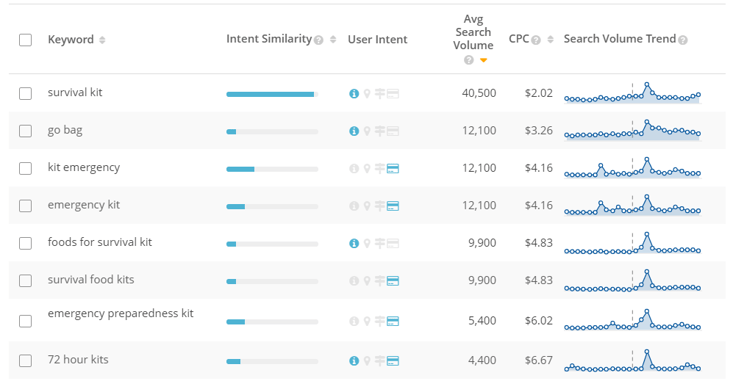
(Discover related keywords and topics, plus their underlying intent.)
For a taste of this powerful capability, try our  data set (one of the three data sources).
data set (one of the three data sources).
You'll get five free keyword search queries per day, and 10 per day after you register.
Assess the search landscape to reveal content opportunities, win Google’s Answer Box, understand global performance, and plenty more. And, you get access to Baidu keyword research with 5+ million terms.
Add in analytics data to reverse Google’s “term not provided” to pinpoint relevant keywords, and your keyword research is complete!
To see the full platform, along with that 30+ billion keyword data set, schedule a quick time to chat and get a 5-day free trial into the platform.
seoClarity Pricing
- Starts at $750 per month for 5,000 daily keyword tracking, keyword research, and content analysis and optimization. Our Essentials package is offered at 50% off the first month, too.
Ahrefs
Ahrefs’ Keywords Explorer operates on the largest third-party database of search queries in the world – it currently contains 7 billion keywords and is updated monthly.
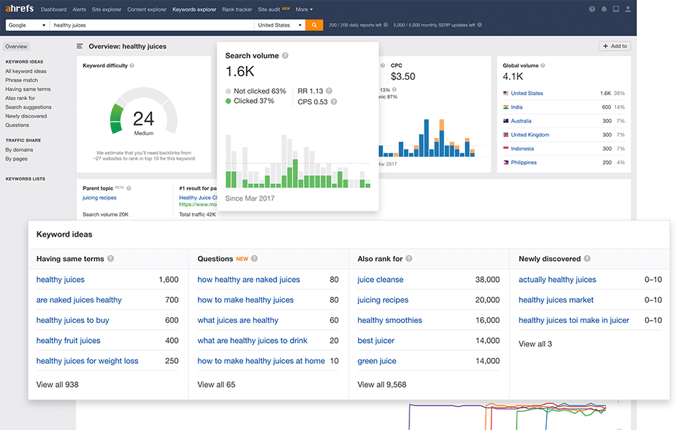
Besides Google, data is also available for a variety of search engines, including Amazon, Bing, Baidu, and others. Keyword volumes for these other search engines are estimated based on insights from clickstream data.
The Keywords Explorer has a variety of abilities, including a keyword difficulty score that alerts you as to how hard it will be to rank organically for a target key term, a SERP overview and positions history, and keywords lists for segmentation.
All in all, the Keywords Explorer has data for 171 countries.
Ahrefs Pricing
In terms of cost, Ahrefs offers four packages that each have their own price point and number of keyword reports per day.
- Lite Package: $99 per month, 25 reports per day
- Standard Package: $179 per month, 100 reports per day
- Advanced Package: $399 per month, 200 reports per day
- Agency Package: $999 per month, 1,000 reports per day
Note: For all reports, whether you put a single keyword or a list of keywords (up to 10,000) into Keywords Explorer, it is counted as “one report.”
BrightEdge
BrightEdge is an SEO platform, meaning they handle all-things SEO. With BrightEdge, you can create your keyword portfolio, group the keywords into categories, and identify potential opportunities.

BrightEdge’s Data Cube – powered by their DataMind – allows you to discover new topics that you can tackle in your SEO strategy.
When you enter a phrase into Data Cube, natural-language processing will show you a list of semantically-related topics that are related to your original keyword.
Data Cube also allows you to conduct keyword research with ease – filters allow you to narrow in on the terms that matter to you.
Graphs also show overall trends of your SEO efforts, and you can compare those trends with your competitors’ performance.
BrightEdge Pricing
BrightEdge offers no pricing information on their website, but you can learn more by requesting a demo.
Conductor
Another SEO platform, Conductor allows you to find high-converting keywords with their Explorer feature.
Explorer uses organic, social media, and demographic insights to bring you content ideas that will relate to your audience on a variety of channels.
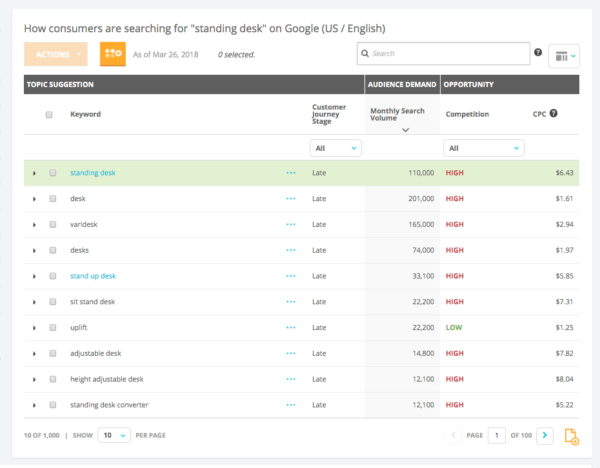
The insights available also allow you to get to know your target audience – demographics like age, occupation, and location are all available. Find competitors’ strengths and weaknesses too by analyzing any site’s organic performance and see their gains and losses.
You can also get a glimpse into paid search – find search terms with a high CPC price and alter your strategy accordingly.
After you’ve completed your keyword research, Conductor makes it easy to turn your work into a content brief that can be shared with tasks managers (Asana, Trello, JIRA).
Conductor Pricing
Conductor offers no direct pricing on their website.
KWFinder
Powered by Mangools, KWFinder presents you with keywords that have a low SEO difficulty score and a high search volume. Or, you can do some research into the competition.
Enter their domain or URL and you’re presented with the keywords that they rank for.
KWFinder allows you to pull historical search volumes and see long-term trends to create content based on seasonality. All of your keyword research can be location specific – you’re able to choose from more than 50,000 locations.
According to KWFinder, they have 1.6 billion keywords (that is growing by about 20 million keywords every month), and about 100 million competitor keywords are checked monthly.
KWFinder Pricing
- Mangools Basic: $49 per month, 100 keyword lookups per 24 hours
- Mangools Premium: $69 per month, 500 keyword lookups per 24 hours
- Mangools Agency: $129 per month, 1,200 keyword lookups per 24 hours
Long Tail Pro
With Long Tail Pro, you enter a seed word and receive up to 400 long-tail keywords. To narrow down the selection, filter results by CPC, search volume, etc.
It also allows for 200 manual keyword entries at a time.
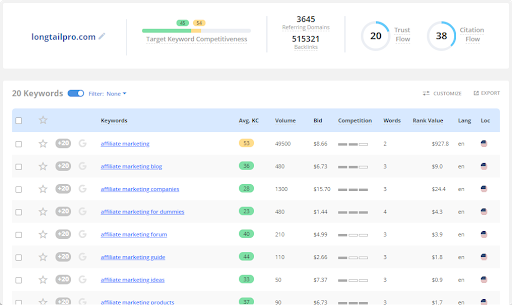
Keyword and competitor analysis are also computed for 13 metrics. To get an idea of keyword difficulty, a 0-100 score is given so you can get a precise idea of how hard it will be to rank for a certain keyword.
A built-in rank tracker is included to gauge the success of your keyword research and subsequent campaigns. The SEO tool will update your rankings for each keyword on a daily basis.
Long Tail Pro Pricing
- Monthly Starter: $37 per month, 800 keyword lookups per 24 hours
- Monthly Pro: $67 per month, 2,500 keyword lookups per 24 hours
- Monthly Agency: $147 per month, 6,000 keyword lookups per 24 hours
Moz Pro
No data in the Moz database is older than two weeks old – including their English keywords and their SERP data. This database allows you to find suggestions and keyword opportunities that can help you face your competitors.
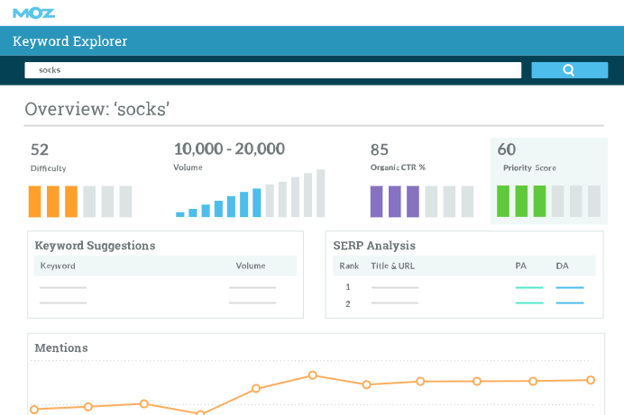
When you conduct your keyword research, organize the process with customizable lists that you can add to, prioritize, and compare.
Sort by search volume estimates (95% accuracy), add weight to a keyword’s importance, and estimate CTRs with difficulty metrics to prioritize your keywords.
Moz Pro Pricing
- Standard: $99 per month
- Medium: $170 per month
- Large: $299 per month
- Premium: $599 per month
Semrush
Enter a seed keyword and receive 2+ million keyword ideas for that term. Then, filter down the results to find the keywords that will be most beneficial to you. Filter by SV, keyword difficulty, CPC, and more.
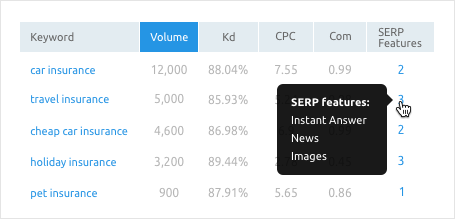
Semrush will also suggest keyword groups based on the search topic so you can segment your keywords in meaningful ways.
Once you’ve found the right keywords, save them in Semrush’s Keyword Analyzer. According to Semrush, you can send up to 1,000 keywords to the Keyword Analyzer.
Users can also create target keyword lists (up to 50) which allow you to organize your processes.
Semrush Pricing
- Pro: $99.95 per month, for freelancers
- Guru: $199.95 per month, for growing marketing agencies
- Business: $399.95, for agencies and businesses with a high web presence
Serpstat
Serpstat lets you find out which keywords your competitors are using for both organic and paid efforts so you can increase your own search visibility.
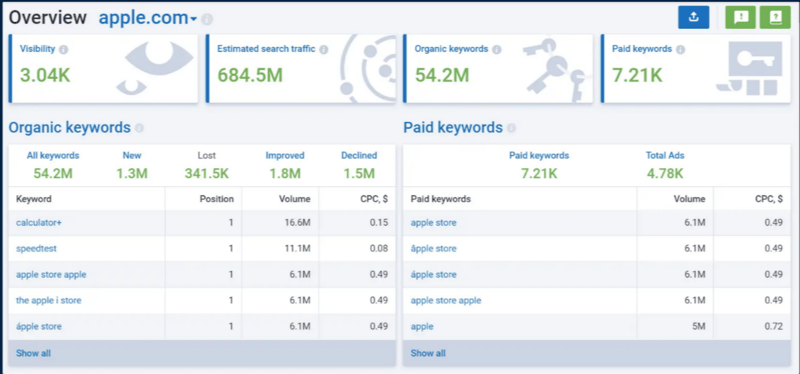
Since all keywords are not equal, use the platform to determine the value of the keywords based on different KPIs and metrics, like search volume, CPC, number of search results, etc.
To get an idea of overall trends, Serpstat presents you with keyword trends for the past year. Plus, monitor the SERP and see which new pages are beginning to appear for your keywords.
All of their keyword research is available in all major languages that are spoken in the countries in their database. The Serpstat database now sits at 5.62 billion keywords, and 922 million keywords in SERPs.
Serpstat Pricing
- Lite: $69 per month
- Standard: $149 per month
- Advanced: $299 per month
- Enterprise: $499 per month
Spyfu
Spyfu offers unlimited searches plus multiple ways to help you understand the keyword research journey. You’re given access to all metrics for both SEO and PPC, plus a screenshot of every SERP to visually confirm the results.
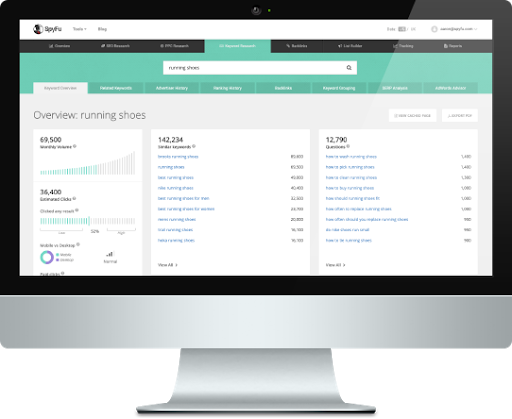
Generate keyword ideas and use custom filters to narrow down the results. The tool’s ability to generate questions also shows you what people are searching for, so you can create content around that topic.
In fact, Spyfu claims to be “better than Google at suggesting profitable keywords.”
Spyfu also allows you to analyze the rise and fall of competitors’ rankings history, so you can analyze the reason of what caused a competitor to lose their positioning.
Spyfu Pricing
- Basic: $39 per month
- Professional: $79 per month
The Best Free Keyword Research Tools
Google Keyword Planner
Google’s Keyword Planner is a free Google Ads tool, so you’ll need a Google Ads account, but it’s a great tool for keyword research, whether you’re new or a veteran.
First and foremost, Google Keyword Planner helps you find targeted keywords so you can create a new campaign or enhance an existing one.
Google offers a variety of filters, including text, search volume, bid price, and more to ensure you select the right keywords for your campaign.
It can also show you historical statistics and traffic forecasts. This information can be great for determining which keywords to focus on, and what performance they may drive.
Since Keyword Planner is a Google Ads tool, it’s really focused around paid search. Because of this, it can help you select competitive bids and budgets for your campaigns.
Google Trends
Another free SEO tool, Google Trends may not be as in-depth as the other keyword research we’ve seen but it does present some key use cases, like identifying seasonal trends and keyword suggestions.
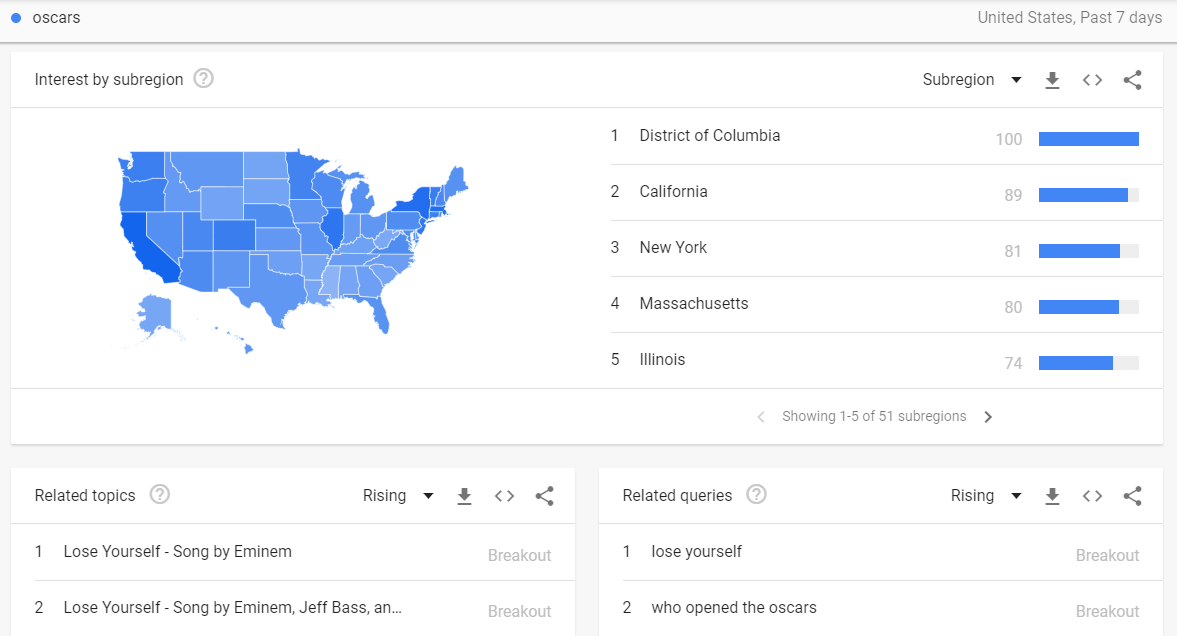
(Google Trends for the search term “Oscars”)
With Google Trends, you can see a keyword’s interest over time, which is great for discovering seasonality and planning your content strategy around the rises and falls.
You can also see interest in a topic by sub-region and related keywords and topics.
As a free keyword research tool, Google Trends is a powerful little engine for seeing trending searches around the world.
Keyword Tool
KeywordTool.io offers a free and paid version, and it goes without saying that there are some major differences between the two.
The free version of Keyword Tool offers 750+ long-tail keyword suggestions for each search term you enter. The process is fueled by search engines’ autocomplete, which are the suggested search terms that show up in the search bar as you type.
Plus, there’s no need to make an account – simply type in a keyword, the preferred language, and go.
The paid version of Keyword Tool can show you, on average, twice as many results, as well as search volume, trends, CPC, and the number of advertisers currently bidding on those key terms.
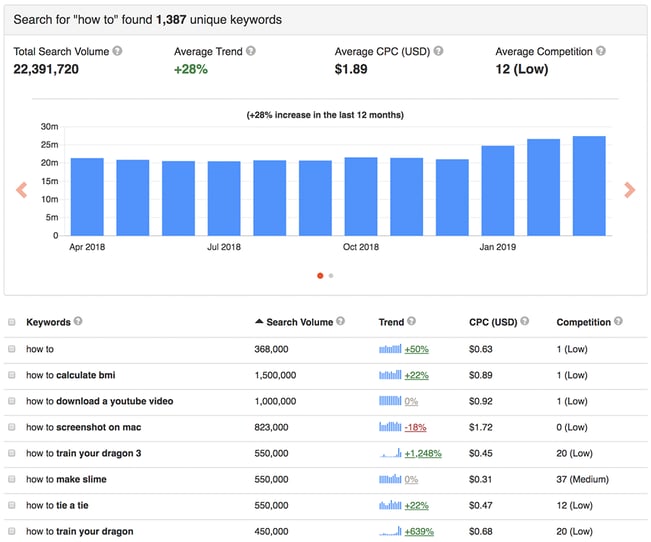
(Image source — Pro Version)
The image above is a glimpse at the Pro version, which has a greatly different interface than the free version.
Keyword Tool Pricing
- Pro Basic: $89 per month, 7,000 keywords per day
- Pro Plus: $99 per month, 35,000 keywords per day
- Pro Business: $199 per month, 70,000 keywords per day
What Is the Best Keyword Research Tool?
Picking the best keyword research tool for your SEO program is going to depend on your overall organic search goals.
When researching the tool that’s right for you, keep in mind the quality of the tool’s data set, what industry the dataset covers, and which countries and languages it includes.
Keyword research is at the forefront of SEO, especially when in today’s world SEO and content go hand-in-hand. Having the right data to act on impacts your entire content strategy, and can be the difference between ranking on page one of Google search, or not ranking at all.
More of the Best SEO Tools
- SEO Tools Comparison: Choosing the Right SEO Software for Your Organic Search Program
- The 13 Best Site Audit and Crawler Tools
- The 12 Best Keyword Rank Trackers to Monitor SEO Performance
- The 10 Best Content Analysis Tools
<< Editor's Note: This post was originally published in February 2020 and has since been updated.>>





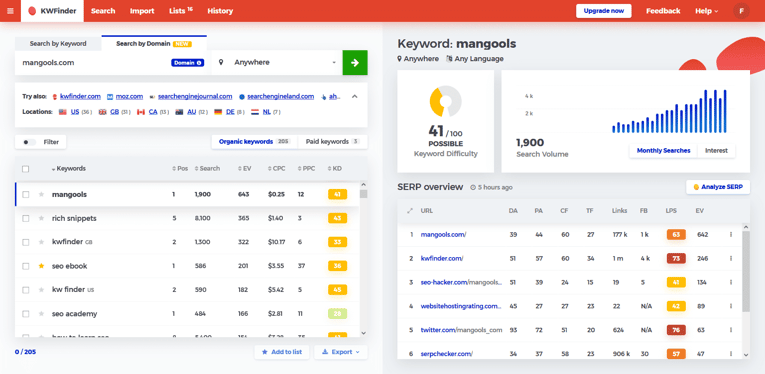




1 Comment
Click here to read/write comments